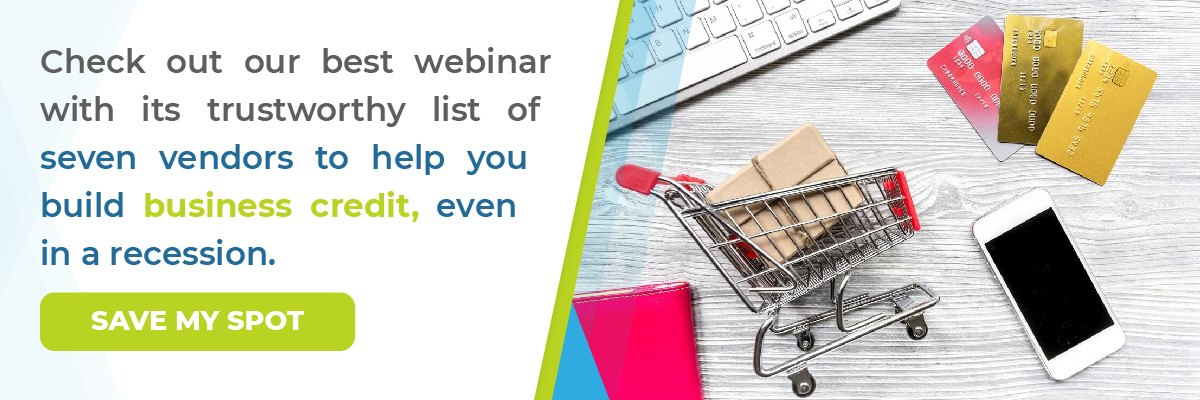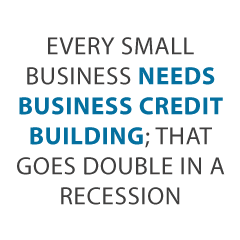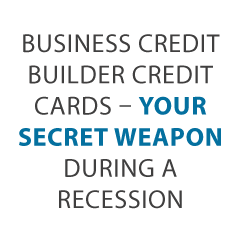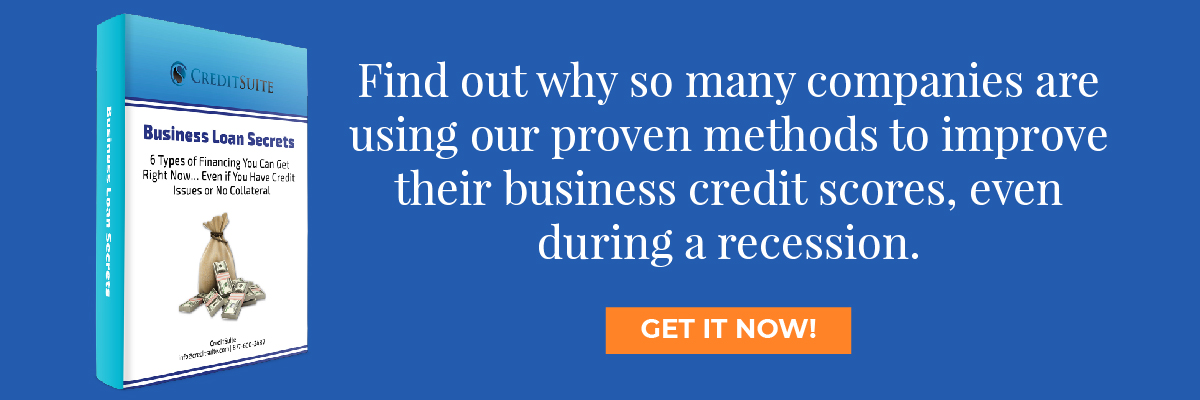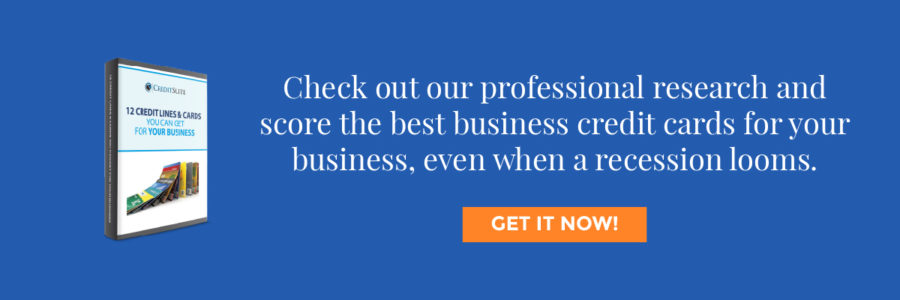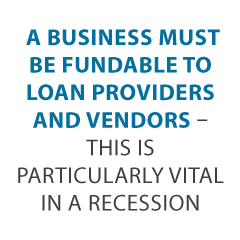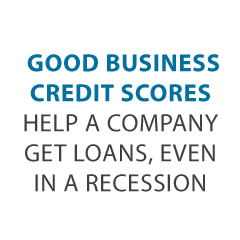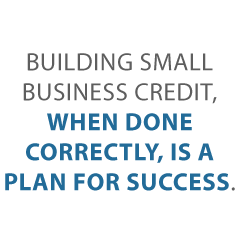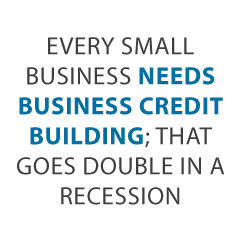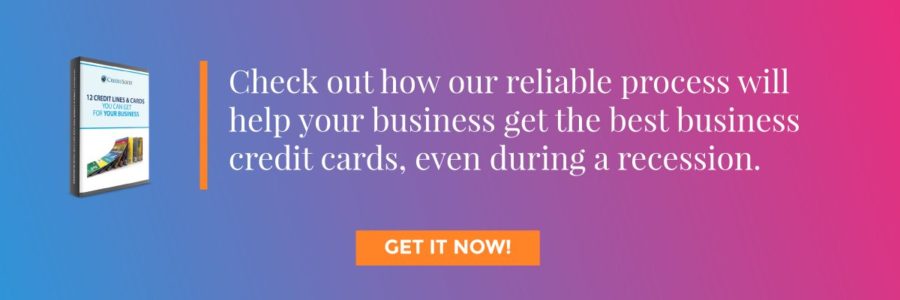
Your Ultimate Get Started Guide to Recession Business Finance
First, with COVID-19 in the picture, you are likely in survival mode. If your business has been affected by the pandemic, you need to sign up for the SBA Paycheck Protection Plan, a Disaster loan, or both. Do it now, because funds are limited and the application process takes time. This will help your business keep going while you figure out the next steps for whatever the future holds for our economy, including recession business finance.
Everything You Need to Know About Recession Business Finance
During a recession, everything changes. There is less spending, less lending, and less cash moving period. Lenders are tighter with what they are willing to dole out, and that leaves many business owners wondering what to do about business funding. It makes recession business finance exceptionally tricky.
Some sources of funding that may work well during the good times are not reasonable to count on for recession business finance purposes. It is important to know what options are available and which ones will work best during harder economic times. Recession business finance can be a bit more difficult to navigate.
There are not as many options for recession business finance as there are for business funding during good economic times. Of the available options, the ones that will work best for you depends on a number of factors. You have to know more about each before you can make an educated decision. It is necessary to know the differences between them, what the qualifications are, and if you even have access to them before you can begin to think about making a decision.
We break it down for you here in our ultimate guide to recession business finance so you can make the best decision possible during the hard times of a recession.
Are Traditional Business Loans an Option for Recession Business Finance?
These are the loans that you go to the bank to get. As a business, your business credit score can help you get some types of funding even if your personal score isn’t awesome. That isn’t necessarily the case with this type of funding.
With a traditional lender term loan, you are almost always going to have to give a personal guarantee. That means they will check your personal credit. If it isn’t in order, you will likely not get approval.
What does it mean to have your credit score in order? If you have a personal credit score of at least 750 you are in pretty good shape. Sometimes you can get approval with a score of 700+, but the terms will not be as favorable.
If you have really great business credit, your lender might be more inclined to offer a little more flexibility. However, your personal credit score will still weigh heavily on the terms and interest rate.
Of all of the available business funding types, this is the hardest to get. It is usually worth the trouble though if possible, because it often has the best rates and terms.
Term loans are not easy to get, and during a recession, it is even harder. Unless you have stellar personal and business credit with an already established, successful business, this is a long shot when it comes to recession business finance.
Check out how our reliable process will help your business get the best business credit cards, even during a recession.
SBA Loans
These are government secured term loans offered through traditional banks. The Small Business Administration, or SBA, works with lenders to offer small businesses funding solutions that they may not be able to get based on their own credit history. Because of the government guarantee, lenders are able to relax a little on the personal credit score requirements.
In fact, it is possible to get an SBA micro-loan with a personal credit score between 620 and 640. These are very small loans, up to $50,000. They may require personal collateral as well.
The trade-off with SBA loans is that the application progress is lengthy. There is a ton of red tape connected with these types of loans.
During a recession however, the government works hard to build the economy. In light of this, SBA loans may still be a viable option.
Business Line of Credit for Recession Business Finance
This is basically the traditional lender’s version of a business credit card. The credit is revolving, meaning you only pay back what you use, just like a credit card. Rates are typically much better that a credit card. The application and approval process, however, is more similar to that of a traditional term loan.
If you need revolving credit and can qualify for a term loan, this is the best option. It is great for bridging cash gaps and covering short term expenses without the high credit card interest rates. If you already have this in place before a recession hits, even better!
There are no cash back rewards or loyalty points though. That makes some business owners prefer business credit cards in some cases, despite higher interest rates.
Since this is basically a revolving traditional loan, it could be as difficult to come by during a recession as a term loan from a traditional lender may be.
When you apply for financing from traditional lenders, they will always ask for certain information. This is regardless of whether you are applying for a line of credit, an SBA loan, or a traditional term loan. You will need to provide, at a minimum:
- A complete, professional business plan if you are a startup
- Complete company financial statements or tax returns for recent years
- A list of owners or officers
- Personal financial information, including bank account balances and credit history
While this list is not exhaustive, it is a good start for what you need to have together before you begin the application process if you plan to pursue this type of recession business finance.
Credit Line Hybrid
A credit line hybrid is basically revolving, unsecured financing. It allows you to fund your business without putting up collateral, and you only pay back what you use.
What are the Qualifications?
How hard is it to qualify? Not as hard as you may think. You do need good personal credit. That is, your personal credit score should be at least 685. In addition, you can’t have any liens, judgments, bankruptcies or late payments. Also, in the past 6 months, you should have less than 5 credit inquiries, and you should have less than a 45% balance on all business and personal credit cards. It’s also preferred that you have established business credit as well as personal credit.
If you do not meet all of the requirements, all is not lost. You can take on a credit partner that meets each of these requirements. Many business owners work with a friend or relative to fund their business. If a relative or a friend meets all of these requirements, they can partner with you to allow you to tap into their credit to access funding.
What are the Benefits?
There are many benefits to using a credit line hybrid. First, it is unsecured, meaning you do not have to have any collateral to put up. Next, the funding is “no-doc.” This means you do not have to provide any bank statements or financials.
Not only that, but typically approval is up to 5x that of the highest credit limit on the personal credit report. Additionally, often you can get interest rates as low as 0% for the first few months, allowing you to put that savings back into your business.
The process is pretty fast, especially with a qualified expert to walk you through it. One other benefit is this. With the approval for multiple credit cards, competition is created. This makes it easier, and likely even if you handle the credit responsibly, that you can get interest rates lowered and limits raised every few months.
Invoice Factoring
An established business with accounts receivable can look to invoice factoring as a source of recession business finance. This is where the lender buys your outstanding invoices at a premium, and then collects the full amount themselves. You get cash right away, without waiting for your customers to pay the invoices.
For those businesses already up and running enough to have accounts receivable, this can be a viable option during a recession. If your customers cannot pay or are paying slowly due to the economic downturn, you can still get the funds you need to run your business, although not at full value of what you would get if your customer paid you.
The cash comes fast, which is also a bonus. Since the lender collects the funds directly from the customer, this can be a really good recession business finance option.
Because this type of funding is based on receivables, it is still a viable option if your business has them. The only problem is, during a recession, sales could go down. This would reduce the amount of funds you have available to you.
If you accept credit cards, you may be able to get a merchant cash advance. It is similar to invoice factoring, but instead of buying your open invoices, the lender advances cash based on expected credit card sales.
Break with Tradition: Look to Non-Traditional Lenders for Recession Business Finance
These are lenders other than traditional banks and credit unions that offer terms loans. Usually they operate online. Occasionally they will have a brick and mortar location as well. The difference between these and traditional lenders is that the loans have looser approval requirements and a much faster application process. Most often you can simply apply online, get approval in as little as 24 hours, and the funds are in your account within 24 to 48 hours after approval.
They are an option if your personal credit isn’t terrible and you need funding fast. In times of recession, these guys are a go-to source as they specialize in lending to those that may have trouble with traditional lenders.
There has been an explosion of non-traditional lenders onto the scene in recent years. Some are better than others. Be sure to research each one thoroughly. Check them out on the Better Business Bureau website and read online reviews to get a good start.
Grants: The Recession Business Finance Miracle
While there are not a lot of these out there, grants are a super source of recession business finance if you can get one. They are usually offered by professional organizations. There are some government grants available also. Competition can be fierce, but they are definitely worth a shot if you think you may qualify.
Requirements vary from grant to grant and most are only awarded to a certain number of recipients. More opportunities are available if you fall into one of the following categories.
- · Women owned business
- · Minority owned business
- · Businesses run by veterans
- · Businesses in low income areas
There are also some corporations that offer grants in a contest format that do not require much other than that you meet the corporation’s definition of a small business and win the contest.
Check out how our reliable process will help your business get the best business credit cards, even during a recession.
Interested in a Government Small Business Grant? Start Here
Federal government small business grants run through the Small Business Administration, but they are rarely awarded directly to a business. Instead, they award the grant to local non-profits or governments to disburse to small businesses in their communities. To find these, check with local economic development agencies and governmental entities to find out what available business funding types they have.
Another place to look is the local Small Business Development Center, or SBDC. These offer support to local small businesses and are generally related to a local college, university, or economic development center.
As a general rule, they do not offer grants themselves. They can, however, point you in the right direction. They know where the money is, who qualifies, and how to start the application process. These agencies also offer many other services to small businesses, making them a great resource regardless.
Corporate grants are another great option if you live in an area where they are available. Companies like FedEx and LendingTree have grant contests each year.
Grants are a great possibility at any stage of business. They shouldn’t be counted on too heavily however. Funds are limited and competition is fierce. A backup plan is definitely necessary if you are planning to use the funds for a specific purpose.
Business Credit Cards: Can They Work as Recession Business Finance?
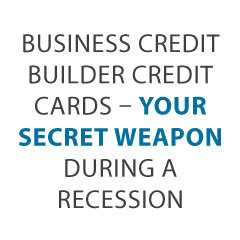 Credit cards as a whole get a bad reputation, but in lieu of another option, they can actually do the trick quite nicely. They are more readily even with a credit score that isn’t awesome, but the lower the credit score the higher the interest rate. Also, there are limits on how low they will go with a credit score.
Credit cards as a whole get a bad reputation, but in lieu of another option, they can actually do the trick quite nicely. They are more readily even with a credit score that isn’t awesome, but the lower the credit score the higher the interest rate. Also, there are limits on how low they will go with a credit score.
However, this is one of the available business funding types that most of the general public are eligible for at any given time. They do a credit check, but your credit doesn’t have to be as high as it would be to gain approval for a traditional loan.
The downside of business credit cards is that they typically have a high interest rate. The upside is that many of them offer rewards in the form of cash or points that can be helpful.
Credit cards are plentiful even during hard economic times. It may be harder to get approval if the recession has hit your credit score hard, but there are ways to fix that.
Apply for business credit cards with your business name and EIN to get them without a personal credit check. If you do not yet have a business credit score, you need to get one. Find more about how to establish and build business credit here.
Best Uses for Each Type of Recession Business Finance
Which type of recession business finance you should use in any given situation depends on many variables. The biggest piece of the puzzles is which types of funding you are eligible to receive. However, there really is more to it than that. Assuming you are eligible for all types of financing, here are some other factors to consider.
Startup During a Recession
In the startup phase, there are a couple of things to think about when determining which funding types might work best.
If you fall into one of those categories that make grants an option, that is the best first stop. Grants are free and clear. That money is yours, without repayment, to use in your business. They typically do not rely on success of the business or the credit worthiness of the owner. The business or proposed business only has to meet the requirements set forth to apply, and then win the grant.
Traditional term loans are a good idea for the startup phase also, if you qualify. The interest rates and terms are generally more favorable than other types of financing for those that meet the credit requirements. They are less of an option during a recession however.
If you do not meet the credit requirements for traditional term loans, then non-traditional lenders are the next best option. They may have higher interest rates, but they do the trick. Plus, they can help build your business credit score if you make your payments on time. That, in turn, makes you more eligible for other types of recession business finance.
While not impossible, it is not usually a good idea to start a business using credit cards if it can be avoided. Of course, invoice factoring is not an option here as you have to already be in business to have the invoices necessary.
Check out how our reliable process will help your business get the best business credit cards, even during a recession.
Growth During a Recession
There are several different aspects of growth that can benefit from various types of business funding.
Inventory Increase
If you see the potential for higher demand and need to increase inventory to accommodate, a revolving credit line is going to work best.
If already in place, these are instantly available to meet the cash needs that a large inventory purchase creates. They also allow for taking advantage of special pricing when available, which can be huge during a recession.
A business line-of-credit works well due to the lower interest rate, but business credit cards will work in this situation also. In fact, if they have really great rewards attached to them, they could even be the better option. It can’t hurt to have both available if you have that luxury so that you have choices.
If available, grants work well for growth projects during a recession also.
Recession Business Finance for Equipment Purchase and Repair
For large equipment, it is best to use traditional term loans of some sort if possible. This is simply because they are typically longer-term loans for larger amounts. Lower interest rates and favorable repayment terms are key. However, we all know that isn’t always possible. Other types of recession business finance can be used if necessary.
Grants may be an option if there is not a time crunch. If time is of the essence, it is possible to purchase equipment on credit cards, but you could run in to problems with cost versus credit limit.
Recession Time Expansion
Expanding during a recession can be tricky, if not downright risky. However, if you want to add on to your current building or add an additional location, term loan financing is the best option. Whether it needs to come from a traditional or non-traditional lender will depend on your specific situation.
Recession Business Finance for Working Capital
Working capital is the cash you have available to run your business. Everything from payroll to repairs, maintenance, seasonal cash gaps, and emergencies are all things working capital covers.
Working capital can come from various sources. There are working capital loans available, but lines- of-credit and business credit cards can work in these situations as well. Unless you already have a working capital loan before the need arises, it is likely you are going to need to access business credit cards or some form of non-traditional financing for this.
In a pinch to cover a cash gap, a merchant cash advance or invoice factoring can work well.
Recession Business Finance Can Be a Delicate Dance: The More You Know About Each Option the Better
It doesn’t matter what type of business you own or whether or not you need funding at this moment. If you own a business you need to know what the available business funding types are, which ones you currently qualify for, and how to qualify for those that are not currently available to you.
You also need to know which types of funding work best in various situations. Once you know these things, you can make an informed decision about how to best fund your business during the recession.
The post Your Ultimate Get Started Guide to Recession Business Finance appeared first on Credit Suite.


